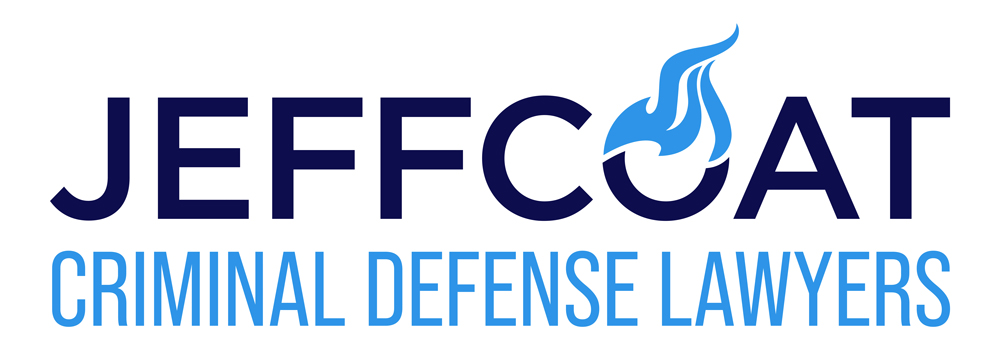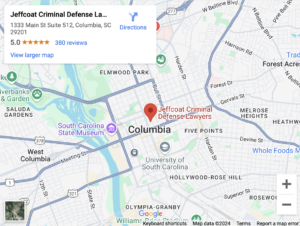
If you’ve been arrested in Columbia, SC, it’s vital to consult an experienced Columbia misdemeanor lawyer. At Jeffcoat Criminal Defense Lawyers we can help reduce charges, fight the case, or negotiate a plea bargain. Contact us today at (803) 200-2000 for a free consultation with a trusted Columbia defense lawyer. Ease your anxiety and protect your future.
Good criminal defense attorneys in Columbia will know how to get the best outcome for your case.
- What Is the Difference Between a Misdemeanor and a Felony?
- Types of Cases Our South Carolina Criminal Defense Law Firm Handles
- Criminal Case Process in South Carolina
- What you Can Expect From Us
- Contact Our Experienced Criminal Defense Lawyer in Columbia, South Carolina
What Is the Difference Between a Misdemeanor and a Felony?

There are two categories of criminal charges: Misdemeanors and felonies. There are several differences between a misdemeanor and a felony.
A misdemeanor is a minor (and typically non-violent) crime that usually carries less serious penalties. Examples of misdemeanor charges include the following:
- Disorderly conduct
- DUI
- Possession of marijuana
- Public intoxication
- Shoplifting
- Simple assault
- Trespassing
- Vandalism
A felony is a serious crime (typically involving violence) that carries severe penalties. Examples of felonies include the following:
- Armed robbery
- Burglary
- Homicide
- Kidnapping
- Rape
- Serious assault
Types of Cases Our South Carolina Criminal Defense Law Firm Handles
When facing such a stressful situation, you can ease your anxiety and empower yourself with legal representation. Good criminal defense attorneys in Columbia will know how to get the best outcome for your case, whether that involves minimizing the charges, fighting the charges, or accepting a plea bargain.
We defend clients against most federal charges, including those listed below:
- Assault and battery (including third, second, and first degree, and by mob)
- Assault and battery of a high and aggravated nature (AB HAN)
- Attempted murder
- Criminal domestic violence ((including third, second, and first degree, and CDV of a high and aggravated nature)
- Harassment (including third, second, and first degree)
- Homicide by child abuse
- Kidnapping
- Manslaughter (both involuntary and voluntary)
- Murder
- Stalking
Criminal Case Process in South Carolina
- Investigation: Most criminal defense cases begin with arrest, but some will begin with pre-arrest investigations. You may even be aware of this investigation before you are arrested. You should contact our criminal defense lawyers as soon as you find out that you are being investigated for criminal charges in South Carolina.
- Arrest: When being arrested, you should be read the Miranda warning, put in handcuffs, and escorted to the police station to be booked for a crime. You will give fingerprints, take a mug shot, be inspected by medical staff, and then be transferred to bond court within 24 hours
- Your Miranda rights are the explanation of rights provided in the Miranda warning (a notification given by police to those in their custody). These rights include the right to be silent, the right to avoid incriminating yourself, and the right to have an attorney present before questioning. As soon as you request a criminal defense lawyer, the police are not allowed to interrogate you further until that attorney arrives. This is how the system ensures that police do not abuse their power. If the police violate your rights, then any statements you made may be suppressed. However, if you make a spontaneous admission of guilt outside of an interrogation, then that admission can still be used against you.
- Bond court: When you are transferred to bond court for a bond hearing, you will face a magistrate judge who will decide if you should be released while your charges are pending, whether bond should apply, and the value of that bond. The judge will make these decisions based on evidence and comments from the defense attorney and prosecuting attorney. This is an important part of your case, and you need to have a good criminal defense lawyer present to speak on your behalf and secure a bond.
- If the judge grants a bond, you will have to pay a deposit for your conditional release from jail. This is paid to the court by yourself or by a bail bondsman (who will charge between 10 and 15 percent of the cost of your bond). If you pay the bond yourself, then it will be returned to you when you show up in court. If you use a bail bondsman, they must be repaid when your obligations are fulfilled.
- Preliminary hearing: You have a right to a preliminary hearing in a criminal case. Your criminal defense attorneys should recommend that you exercise this right within ten days of your bond hearing. This will make the prosecution prove probable cause before they can proceed with the charges. This means that you have a chance to contest your case before it goes further. The judge may decide to modify or even dismiss the charges.
- Pre-trial conferences: Opposing attorneys will meet with the presiding judge prior to the trial date to discuss details such as jury selection, discovery exchanges, and a tentative timeline for the trial.
- If your charges are still in place after the preliminary hearing and pre-trial conference, then you may go to trial. However, you can also negotiate to resolve the case outside of the courtroom; in fact, most criminal cases are resolved through plea bargain negotiations and diversion programs — such as the Pretrial Intervention Program (PTI) — rather than trial. Oftentimes, the prosecution is willing to let you plead to a lesser charge (and receive a lesser punishment) rather than risk losing at trial. If you are unable to negotiate a plea bargain, then the case will go to trial.
It may take several months for this process to be completed and for your case to move to trial
A bench trial takes place with only a judge determining the outcome while a jury trial is presided over by a judge and heard by a jury of your peers (general sessions court has twelve jurors while a magistrate or municipal case has six jurors). During the trial, the prosecution and defense each present their case to prove the defendant’s guilt or innocence. If you are found guilty, you can appeal to fight the conviction and sentence.
After a conviction, you will move onto the sentencing phase, where your punishment will be decided by a judge in accordance with the law.
After sentencing, you still have the right to appeal your case. Your criminal defense lawyer will be able to pursue various avenues of appealing the conviction, but you will likely remain in jail during this process. Some cases do allow for release pending appeal, though you may be confined to your home during this time. You can read what some of our happy clients had to say on our testimonials page.
What You Can Expect from Our Top Rated Criminal Defense Team
From the time you first contact our office, you will:
- Attorney consultation: Our initial legal consultation is always free and always confidential; you’ll meet with a criminal defense lawyer rather than a paralegal or legal assistant
- Your case: You’ll discuss the facts of your case with your criminal defense attorney to establish the inherent strengths and weaknesses of your case; it is important to be completely honest with your lawyer so they know how best to advise you
- Rights and penalties: You and your attorney will discuss your rights, court procedure, possible sentences and collateral consequences following a conviction, and any defenses to the crime with the attorney
If you retain one of Jeffcoat Criminal Defense Lawyers’s local criminal attorneys after your free consultation, we begin acting in your defense immediately by sending a letter of representation to the police and prosecutor assigned to your case (preventing those parties from contacting you) and by filing a motion for discovery (compelling them to provide you with all the evidence being used against you in court).
We’ll then begin fighting your charge by constructing your personalized defense strategy. We’ll consider the unique facts of your case to determine which of the following approaches will secure the best possible outcome for you:
- Accident/mistake: Your actions (and/or its results) were unintentional
- Alibi: Provide evidence that you were not present when the crime occurred
- Coerced/false confession: The statement to the police was a lie or was obtained illegally
- Double jeopardy: You cannot be tried for the same crime twice
- Entrapment: You were tricked into acting illegally by law enforcement or other state agents
- Insanity/incapacity: You cannot be held responsible for your actions due to mental illness
- Lack of probable cause: There is not enough legal evidence to warrant a charge or convictionMere presence: You were at the scene of the crime, but were not involved in the crime itself
- Mistaken identity: Eyewitness misidentification
- Necessity/duress: Your actions were the result of a threat of imminent harm (either by another person or natural circumstances)
- Police misconduct: Law enforcement did not follow legal procedure or protocols
- Self defense/defense of others/stand your ground: You acted to defend yourself or others from an imminent threat
- Someone else did it: The police either arrested the wrong person or you are being framed
- You are innocent: You did not commit the crime
We promise to work diligently on your case, to answer all of your questions in a timely manner, and to aggressively defend your rights, reputation, and freedom. Our goal is always to achieve the best possible result for you, because it is ultimately your decision whether to accept a plea offer or proceed to trial. Your life, your rights, your choice!
Contact Our Experienced Misdemeanor Lawyer in Columbia, South Carolina

When people are charged with criminal offenses in South Carolina, they often assume the situation is hopeless; it’s not. You don’t have to deal with these kinds of charges on your own.
Jeffcoat Criminal Defense Lawyers provides prompt and personalized service with an emphasis on communication about your case. Every case is thoroughly evaluated and reviewed, allowing us to build the best defense possible. Contact us any time for your free consultation.
DISCLAIMER: Every case is different. You should not believe your case will get the same result.
Proudly Serving In:
Columbia | Blythewood | Orangeburg | Richland County | Lexington County
Visit Our Criminal Defense Law Firm Located in Columbia, SC
Jeffcoat Criminal Defense Lawyers
1333 Main St Suite 512, Columbia, SC 29201
(803) 200-2000
Open 24/7


